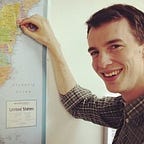Thoughts on 2020
I was in 8th grade gym class when the second plane hit the World Trade Center. My teacher’s face went ash white. “Something terrible has happened.”
In high school I watched us enter two wars that would end up costing over $2.4 trillion.¹ I was honestly confused. War was supposed to be a time of sacrifice, but nothing changed in my hometown, a suburb of NYC. Our lives just kept getting better.
College was more of the same. My private liberal arts school was full of students passionate about changing the world. But the reality around us told a different story. We studied 10 miles from a gutted post-industrial city where beautiful 20th century buildings lined a vacant downtown.
After graduating in 2010, the internet made life even more incredible. If you had the money, you could order anything, find out anything, and even go anywhere — with a tap. It’s no exaggeration to say we could do more than the queens and kings of history.
When Trump was elected President, I was in a room with friends my age who had lived a variation of the same story. In the moment it hit us that Trump would win the election, we were disoriented. It didn’t fit with our understanding of the country we thought we lived in.
Here’s the country we actually live in.
For decades, a mix of globalization and technology innovation have created unimaginably efficient systems for controlling information and goods. That’s how a thumb tap can bring you a car or a bag of groceries.
In the eyes of this new system, the average American is less valuable and more expendable. $35+/hour union jobs that could feed a family are being replaced by less secure and lower paying gig jobs. These too are on the chopping block as automation accelerates. The “unemployment” rate may be at record lows, but all-time numbers of Americans are working dead-end gig jobs or have simply filed for disability.²
At the same time, a new class of worker has risen up in America: those with the education and skills to operate our most sophisticated economic machinery (software). In the span of 25 years, the Internet has catapulted from a novelty to the operating system of our society. Coders don’t just build products, they shape our way of life.
Each of these trends is accelerating. More and more workers are being discarded by our economic system while an elite class becomes more creative and productive at expanding the impact of technology. And it’s just getting started. The coming years will create large scale human suffering for displaced retail clerks, administrative workers, and truck drivers.
Is this the America you want to live in?
This is a dire situation that calls for bold, effective, and immediate solutions. Andrew Yang is the candidate who has identified those problems with precision and put forward an ambitious plan to address them.
You might have heard about this “fringe” candidate with a money giveaway gimmick. Read or watch to learn more about the substance behind Yang’s signature proposal, the Freedom Dividend. More importantly, Yang has identified the real poison running through our society: we’ve allowed our politicians to follow the wrong measurements — GDP, stock prices, and “unemployment” — to the edge of a cliff.
Every citizen — no matter their race, gender, orientation, age — matters in America. We are all stakeholders in a great nation. Our value and potential as human beings transcends what the market is willing to pay at any given moment.
It’s past time for bold solutions that invite our people and communities into the 21st century economy.
